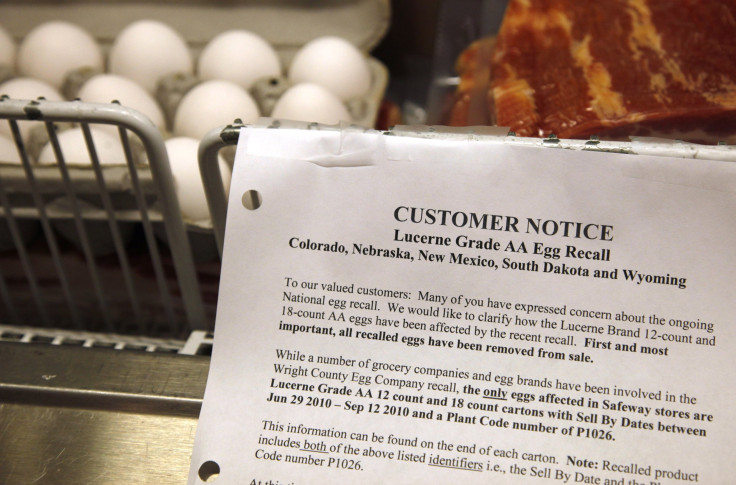What Is Salmonella? Full List Of Food Recalls Caused By Bacteria During 2016 Holiday Season

Salmonella is estimated to cause more than a million illnesses throughout the United States every year, according to the Centers for Disease Control and Prevention. And with the abundance of food purchasing and preparation that takes place around the holidays, avoiding food-borne illnesses caused by bacteria like Salmonella can be difficult. At least six products have been recalled due to possible bacterial contamination in December alone.
A mass recall of products possibly containing Salmonella-contaminated milk powder led a number of companies to pull their items off supermarket shelves in December. The most recent Salmonella-related recalls are shown below, but a full list of product recalls, withdrawals and food safety alerts can be found at the Food and Drug Administration's website.
- Snyder of Berlin: Buffalo Blue Kettle Cooked potato chips
- Williams-Sonoma: Meyer Lemon Poppy Seed quick bread mix
- Poppies International Inc.: Mini eclairs, chocolate covered cream puffs
- Houdini Inc: Gift baskets containing Blue Cheese Savory Twists
- H-E-B: Bakery products
- Ron's Home Style Foods, Inc: Tropical, pineapple nut and pistachio creme fruit salads
- New Hope Mills: Crepe mix

Salmonella, a bacteria discovered by an American doctor named Daniel Salmon, is usually transmitted to humans through foods contaminated with animal feces. There's typically no way to tell that the food is contaminated, as it smells and looks normal, and contamination isn't just limited to animal products. The bacteria can be found in fruits, vegetables and other produce as well.
Salmonella infections ordinarily last four to seven days and cause fever, diarrhea and abdominal pain. In severe cases, particularly in the elderly, children or those with weakened immune systems, the illness can lead to hospitalization or death. If it's not treated properly with antibiotics, Salmonella can also cause lasting, chronic arthritis. It's more important than ever to avoid foods that could be contaminated with the bacteria, as Salmonella has become increasingly resistant to antibiotics. Multi-drug resistant Salmonella bacteria are responsible for a full 10 percent of all infections.
In addition to monitoring recalled products, Salmonella infections can be avoided through proper cooking and storage techniques. Drippings from raw meat and poultry on a kitchen counter or in the refrigerator can transmit the bacteria, as can unwashed or improperly washed cutting boards.
© Copyright IBTimes 2024. All rights reserved.






















